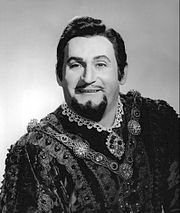If Richard Tucker were alive today, he would be celebrating his centennial—and probably still singing.

The world’s greatest tenor enjoyed a modest, yet memorable career at the Metropolitan Opera Society with a presence that could light up the stage and mesmerize any audience.
He seemed to sound 20 years younger with a flawless technique that kept his voice pliable and energized. I’ll never forget the brief interlude we had together.
We met one evening in 1971 following a concert he gave in Nashua, N.H. A cousin was associated with a group called Community Concerts and Richard Tucker was on their Billboard. It was just a simple stage setting and not the Met. Didn’t matter to this operatic star.
Beneath the veneer, he proved to be a simple man with simple tastes. I found that out after enjoying the pleasure of his company.
I was working for The Gazette at the time, five years into what would be a long journalism career there. Two of my three children were constantly exposed to classical music, along with a wife who tolerated Mozart and Bach. We were a happy, musically oriented family.
“Let’s attend the concert,” I suggested.
“No way can we take two small children to an opera,” a voice shot back. “That would be suicide if they acted up.”
“We’ll get a baby sitter.”
Easier said than done. None to be found anywhere on such short notice. After some coaxing, we decided to go anyway, children and all, ages two and five.
We packed the bags with coloring books and sleeping gear, snacks, and other deviants to keep them occupied.
I was in my glory. Richard Tucker took his place in my heart’s repertoire along with the great Caruso, Lanza, Pavarotti, and Domingo. Nobody could sing “Pagliacci” better. I listened to everything he ever sang, buying his records and tapes as if they were collectibles.
The flip side was a father who played baseball with his kids in the neighborhood and took the children to the prop room of the Met so they could play with the swords.
Tucker was immense that evening with only a pianist for accompaniment. I just had to meet him in person, given my editorial privileges as a journalist. Passing myself off as a critic, I rapped on his door backstage with my family behind me. Out he came, looking like the last guy from a train wreck. He appeared exhausted, as any entertainer would after such a vigorous recital.
He saw my two kids and gave them each a hug. “Bravo,” he said. “I love seeing kids at my concerts. I wish more people would bring their children.”
Four years later, Tucker died of a heart attack just before an evening performance in Michigan. I was processing photos in the darkroom and heard the tragic news on my radio, broken with tears.
Without further ado, I sat at a typewriter and rekindled our wonderful encounter in Nashua and the indelible memory it had left with me. A few months passed when an unsuspecting letter arrived from the Met. It was from his wife, Sara Tucker, thanking me for the memorial tribute to her late husband.
“Children were a big part of Richard’s life,” she wrote. “He mentioned that interlude in Nashua and we’re forever grateful. Please continue to enjoy Richard’s music.”
I had the tribute laminated with his wife’s letter and it’s kept a venerable place in my files ever since. As for his music, it continues to be part of my listening pleasure. I still play the 33’s.
This past Nov. 17, Tucker’s memory was celebrated at The Lincoln Center on the centennial of his birth. Many of the greatest voices of our time paid proper tribute to the singer while I melted on the couch.
Adjacent to the center is a park named after Richard Tucker as a tribute to his legacy at The Met. A music foundation has also been formed to perpetuate his memory. He is the only person whose funeral has been held on the stage of the Metropolitan Opera.
I cannot tell you what kind of music my children are tuned into now. Suffice it to say it isn’t opera, much less Tucker. Listening to the Grammies a few months ago, I think Tucker and his contemporaries would have cringed just a little over the polar extremes music has taken.
Immortality is when a singer is dead but his music is still alive. Nearly 50 years have passed and Richard Tucker’s charm still prevails.


Wow, what I nice tribute. Richard Tucker is my favorite opera singer. Personally, I think he has the best operatic voice I have ever heard. I could listen to his beautiful voice all day, especially his 1962 recording of Madame Butterfly with Lyentine Price. Reading your article as well as the biography of Richard Tucker, he seemed like such a nice man. My prayers are with him and his family.